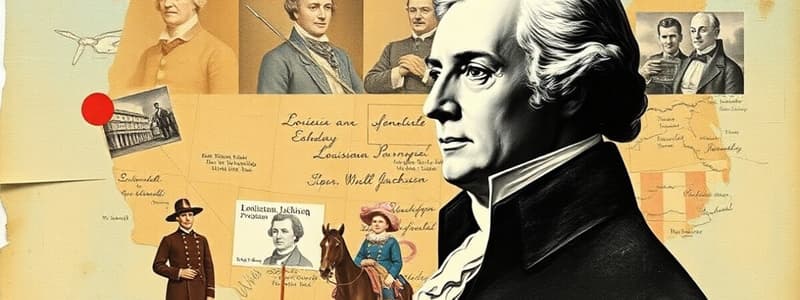Podcast
Questions and Answers
What was one of the main objectives of Lewis and Clark's expedition following the Louisiana Purchase?
What was one of the main objectives of Lewis and Clark's expedition following the Louisiana Purchase?
- To colonize the native lands
- To establish a formal government in the newly acquired territory
- To map the new territory and chart waterways (correct)
- To find a quicker route to Asia
How did the Louisiana Purchase influence the expansion of the United States?
How did the Louisiana Purchase influence the expansion of the United States?
- It became a cornerstone of American westward expansion (correct)
- It limited the potential for trade and resources
- It created immediate peace with all Native American tribes
- It eliminated all political tensions related to expansion
What impact did Lewis and Clark's discoveries have on American perceptions of the West?
What impact did Lewis and Clark's discoveries have on American perceptions of the West?
- They discouraged interest in western expansion
- They helped stimulate interest and investment in exploration (correct)
- They were primarily focused on the southern states
- They shaped a negative outlook on the West
What social issue intensified alongside the westward expansion initiated by the Louisiana Purchase?
What social issue intensified alongside the westward expansion initiated by the Louisiana Purchase?
What was a significant result of the mapping efforts by Lewis and Clark?
What was a significant result of the mapping efforts by Lewis and Clark?
What year did the Louisiana Purchase occur?
What year did the Louisiana Purchase occur?
Who was the French leader that decided to sell the Louisiana Territory?
Who was the French leader that decided to sell the Louisiana Territory?
What was one of Thomas Jefferson's concerns regarding the Louisiana Purchase?
What was one of Thomas Jefferson's concerns regarding the Louisiana Purchase?
How much land was acquired in the Louisiana Purchase?
How much land was acquired in the Louisiana Purchase?
Which U.S. diplomats negotiated the Louisiana Purchase?
Which U.S. diplomats negotiated the Louisiana Purchase?
What strategic value did the Louisiana Territory provide to France?
What strategic value did the Louisiana Territory provide to France?
What was a significant impact of the Louisiana Purchase on the U.S.?
What was a significant impact of the Louisiana Purchase on the U.S.?
What concern was raised about the authority of the government during the Louisiana Purchase debate?
What concern was raised about the authority of the government during the Louisiana Purchase debate?
Flashcards
Louisiana Purchase
Louisiana Purchase
A land deal in 1803 where France sold a vast territory to the United States for $15 million.
Thomas Jefferson
Thomas Jefferson
President of the United States who played a key role in acquiring the Louisiana Territory.
Napoleon Bonaparte
Napoleon Bonaparte
French leader who sold the Louisiana Territory to the U.S.
Mississippi River
Mississippi River
Signup and view all the flashcards
Westward Expansion
Westward Expansion
Signup and view all the flashcards
Strategic Importance for France
Strategic Importance for France
Signup and view all the flashcards
Financial Motivation for France
Financial Motivation for France
Signup and view all the flashcards
Size of the Purchase
Size of the Purchase
Signup and view all the flashcards
Diplomats Monroe and Livingston
Diplomats Monroe and Livingston
Signup and view all the flashcards
Controversies regarding the Purchase
Controversies regarding the Purchase
Signup and view all the flashcards
Louisiana Purchase
Louisiana Purchase
Signup and view all the flashcards
Lewis and Clark Expedition
Lewis and Clark Expedition
Signup and view all the flashcards
Westward Expansion
Westward Expansion
Signup and view all the flashcards
Native American rights
Native American rights
Signup and view all the flashcards
American perceptions of the West
American perceptions of the West
Signup and view all the flashcards
Trade and resources
Trade and resources
Signup and view all the flashcards
Study Notes
Background of the Louisiana Purchase
- The Louisiana Purchase was a land deal between France and the United States in 1803.
- France sold roughly 828,000 square miles of land to the U.S. for approximately $15 million.
- This expansive territory included parts of fifteen current U.S. states.
- This purchase significantly increased the size of the newly formed country.
Key Figures Involved
- President Thomas Jefferson played a crucial role in the acquisition.
- James Monroe and Robert Livingston were U.S. diplomats who negotiated the deal with France's representative, Napoleon Bonaparte.
- Napoleon Bonaparte was the French leader who decided to sell the territory.
Motivations and Circumstances
- The decision to sell was primarily because France was embroiled in wars in Europe and needed quick revenues. The war with Britain threatened French holdings in North America.
- The Louisiana Territory was strategically important to France in their imperial ambitions. It provided a vital link to the region of Canada and other French colonies.
- Thomas Jefferson, despite initially being hesitant, recognized the immense potential of the land and the strategic value it provided the U.S.
- This acquisition allowed for westward expansion plans pursued by many Americans.
Terms of the Purchase
- The agreement involved a complex transaction and the determination of borders.
- A final price was determined by the French government of slightly over $15 million.
- The sale encompassed all the land drained by the Mississippi River and its tributaries.
- A clear boundary delineation was crucial for defining the area being transferred.
Impact and Significance
- The acquisition dramatically expanded the United States' territory and power in North America.
- It allowed for the westward expansion of the growing U.S. population.
- It granted access to vital resources and navigable waterways.
- The event demonstrated the growing power and influence of the United States in the New World.
- New transportation routes were established.
- It set a precedent for the use of diplomatic relations and negotiation for land acquisition for the USA.
Controversies and Criticisms
- Some Americans opposed the purchase due to concerns about the cost and potential impact on the nation's finances.
- The purchase was initially met with some controversy due to its scale. Some wondered whether the government had the authority to spend such a massive amount.
Exploration and Settlement
- Following the Purchase, Meriwether Lewis and William Clark undertaken the famous expeditions, exploring the land bought from France.
- Their journey was crucial in mapping the new territory, establishing contact with native peoples, charting waterways, and gathering information about the region.
- Their discoveries helped shape American perceptions of the West.
- This stimulated significant interest and investment in further exploration and settlement opportunities.
Long-Term Implications
- The Louisiana Purchase greatly influenced the future expansion and development of the United States.
- It became a cornerstone of American westward expansion and helped shape the nation’s modern borders.
- It created new opportunities for trade and resources. It also created new political and social tensions related to westward expansion.
- Debates about the rights of Native Americans and the proper ways to interact with them intensified with further expansion.
Studying That Suits You
Use AI to generate personalized quizzes and flashcards to suit your learning preferences.




